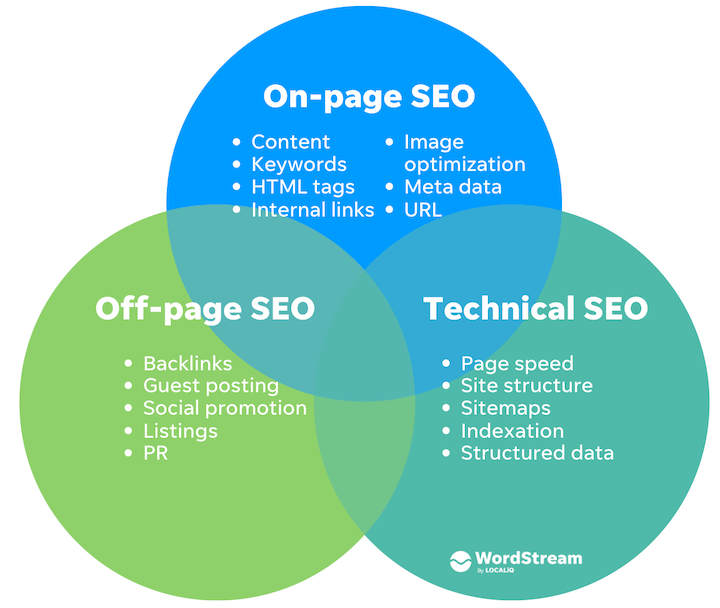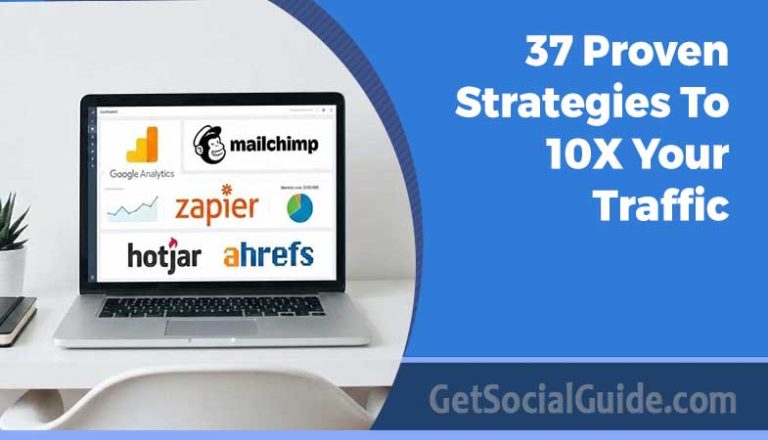Why On-Page SEO Is Just As Important As Off-Page SEO? Beginner’s Guide
Search engine optimization, or SEO in short, is a vital element of any digital marketing strategy. It is a complex technique that involves various factors. Before you decide to take the leap and invest in an SEO strategy, you first need to understand how it works and the various techniques you can utilize to achieve your desired results. SEO includes numerous online tools that allow you to improve your website’s ranking on different search engines, especially Google, to increase online traffic and boost sales.
On-page SEO and off-page SEO play critical roles in the success of a website. On-page SEO primarily involves optimizing individual web pages to attain higher rankings and attract more relevant traffic from search engines. This optimization encompasses the content of the page, the HTML code, and the inclusion of images and other media. On-page SEO is crucial because it aids search engines in comprehending a page’s content and assessing its relevance to specific search queries.
Conversely, off-page SEO pertains to activities conducted outside of the website to enhance its search engine rankings. This includes strategies such as link building and social media marketing, aimed at boosting a website’s visibility and authority. Off-page SEO is significant because it can enhance a website’s credibility and trustworthiness, ultimately leading to higher search engine rankings and more relevant traffic.
In essence, both on-page and off-page SEO are essential for a website’s success. It’s imperative to focus on both aspects to achieve optimal results in the highly competitive online landscape.
While utilizing SEO, you need to consider tons of aspects—one of which is On-page SEO. Also referred to as on-site SEO, on-page SEO allows you to make your website more search engine friendly. It helps you attract more online traffic while providing you with the means to measure the success and performance of your On-page SEO campaign.
That said, new websites have to invest heavily into On-page SEO to experience any chances of growth and success. When using On-page SEO techniques, businesses can get the message across to their target audience in a highly effective way. Therefore, it will increase their chances of success in the early stages.
However, if you still aren’t convinced that On-page SEO is the right approach to take, listed below are a few of its importance’s that will convince you otherwise.

The Significance of SEO for All Websites
Before delving into the specifics of on-page and off-page SEO, it’s essential to understand the broader importance of search engine optimization.
On a daily basis, the average online user engages in a wide array of web searches. Whether it’s for finding directions to the nearest shoe store or discovering the exact number of steps in the Eiffel Tower, the search bar is our go-to tool. In fact, over 50% of online traffic originates from organic search.
In essence, SEO holds paramount importance because all websites share a common goal – to be discovered and visible to their target audience. The search engine rankings of a web page wield the power to drive traffic, generate leads, and enhance conversions. Consequently, SEO is a critical component that influences nearly every facet of your online marketing strategy.
On-Page SEO
On-Page SEO is the practice of optimizing the content and elements on a web page to improve its visibility and ranking in search engine results, particularly in Google searches. This optimization process focuses on elements that are within the control of the website owner. It involves various factors, such as optimizing keywords, meta tags, headings, content quality, and HTML code, as well as ensuring a user-friendly and mobile-responsive design. On-page SEO aims to make web pages more relevant and appealing to both search engines and website visitors.
Peter Meyers from Moz pointed out that the emphasis on on-page and off-page SEO can vary among website owners based on their strategies and priorities. Some website owners may prioritize on-page SEO by optimizing factors directly related to their website, while others may place a higher priority on off-page SEO strategies. The balance between on-page and off-page SEO depends on the specific goals and priorities of each business owner.
Off-Page SEO?
Off-Page SEO, also known as “off-site SEO,” encompasses all the factors that influence your web page’s ranking but exist beyond the boundaries of your website.
A prime example of off-page SEO is “backlinks” or “inbound links.” These are links on external web pages that direct visitors back to your website. When your website acquires a substantial number of backlinks from reputable and authoritative websites, it can positively impact your search engine rankings because these external pages can transfer some of their authority and credibility to your site.
While backlinks are a classic illustration of off-page SEO, this facet of SEO involves a broader range of strategies. It encompasses SEO tactics related to social media, domain authority, and other external factors that influence your website’s visibility and authority in search engine results. Off-page SEO is more complex than on-page SEO but is equally vital for enhancing your website’s search engine performance.
Comparison Between On-Page and Off-Page SEO in table format:
| Aspect | On-Page SEO | Off-Page SEO |
|---|---|---|
| Basic Activities | – Quality content | – Link building |
| – Keyword optimization | – Guest posting | |
| – Title modification | – Answering in Social Forums | |
| – Meta modification | – Competitor research | |
| – Image optimization | ||
| – Optimize website loading time | ||
| Focus | Analyzes your website’s overall performance. | Promotes your website and expands its online reach. |
| Key Component | Includes internal linking. | Acquires backlinks from other sites, known as backlinks. |
| Common Techniques | – Create high-quality content. | – Guest Blogging |
| – Modify titles and header tags (H1, H2, H3, etc.). | – Acquire backlinks | |
| – Edit meta tags. | – Engage in Social Forums | |
| – Revise webpage content. | – Appear on Social Media platforms | |
| – Optimize images and use Alt Text. | – Write reviews | |
| – Optimize URLs. | – Exchange links | |
| – Build internal links. | ||
| – Focus on fast-loading web pages. | ||
| Purpose | Optimizes your site to appear in Google SERPs. | Establishes the reputation and reliability of your website. |
This table presents a concise comparison of the key differences between On-Page and Off-Page SEO techniques and their respective focuses and objectives.
On-Page SEO Elements
Enhancing Website Performance
Now that you have a better understanding of what on-page SEO encompasses, let’s delve deeper into each element and explore optimization strategies. You can start working on these elements as soon as your website is up and running.
Core Web Vitals
Core Web Vitals consist of metrics used by Google to assess a website’s performance, speed, and user-friendliness. These metrics gauge the user experience, including page loading speed, interactivity, and visual stability.
Optimizing Core Web Vitals is essential for boosting user engagement, conversion rates, and reducing page abandonment. Research by Google reveals that sites meeting Core Web Vitals standards experience a 24% lower likelihood of page abandonment.
You can identify and address user experience issues by utilizing Google’s Core Web Vitals Report.
Title tags, also known as Meta Titles, are HTML elements that provide a concise and accurate description of a webpage’s content. These titles appear in search engine results, making them crucial for both usability and SEO. Optimized title tags significantly enhance your website’s visibility in search results.
Title tags don’t have to mirror the <H1> title of your blog post precisely. They can be shorter or more enticing. In WordPress, you can set a custom title tag using plugins like Yoast, ensuring it includes your main keyword, is under 60 characters, and is descriptive yet concise.
Meta Descriptions
Meta descriptions are brief content summaries that appear beneath titles in search engine listings. They present an opportunity to provide additional information about your content or entice users to click through to your website.
Your meta description should include your focus keyword, describe your content, and be under 155 characters in length.
Content Quality
Publishing high-quality, original content sets you apart from competitors. Use H2 and H3 headers in your content to enhance readability and provide clarity to users and search engine crawlers. After writing your content, employ content optimization tools like Surfer, Clearscope, or Dashword to identify missing keywords, assess readability, and optimize your content for improved rankings.
Site Architecture
Effective site architecture involves organizing your content and creating a logical structure that facilitates navigation for both users and search engines. Visualize a plan that starts with your homepage at the top, followed by main menu pages. For diverse content, consider categorizing topics to help users locate information easily.
Internal Linking
Internal linking connects different pages on your website to related content. This enhances user navigation, encourages longer site visits, and boosts search engine rankings by increasing engagement. It also aids search engine crawlers in understanding page relationships. Tools like Link Whisper simplify internal link management.
Image Optimization
Optimizing images involves reducing file sizes while maintaining quality, tagging images with captions and alt-text descriptions for accessibility, and adhering to image title tag best practices to improve SEO.
Site Speed
Optimizing site speed is vital for a positive user experience and higher search engine rankings. Fast-loading websites tend to rank higher. Choose a fast, lightweight theme to enhance site speed.
Security
Website security is a vital aspect of SEO. A secure site is less likely to face search engine penalties, benefiting your traffic. Implement HTTPS/SSL encryption to secure data transfer and build trust with users. Secure websites also influence crawling behavior, positively impacting SEO.
By addressing these on-page SEO elements, you’ll enhance your website’s performance, user experience, and search engine rankings.
OFF – Page SEO Contasts of following Elements
Off-page SEO has distinct characteristics. These off-page SEO tactics involve securing links and mentions for your website from external sources, and unlike on-page SEO, you may not have full control over these external factors.
Nevertheless, it’s essential to understand that off-page SEO holds just as much significance as on-page SEO and should not be underestimated.
You can commence implementing these off-page SEO strategies once the key pages on your website are prepared and you have valuable content ready for sharing.
Backlinks:
Backlinks stand out as the central element of off-page SEO. This is due to their role as signals to search engines, indicating that other websites deem your content reliable and valuable.
When building backlinks for your site, it’s crucial to prioritize quality over quantity. Not all backlinks are equal, and you should aim for backlinks from high-authority websites within your niche, which have a low spam rating.
You can acquire backlinks through various methods, including:
- Guest-posting on other websites.
- Responding to HARO (Help a Reporter Out) queries.
- Establishing yourself as an authority in your niche by creating original research and content that other websites are keen to link to.
- Utilizing an agency to assist in backlink building efforts.
Mentions:
Online mentions across blogs, articles, forums, and various websites serve to enhance awareness of your presence and can potentially draw attention to your products or services.
Mentions also contribute to building trust and credibility among customers, demonstrating your widespread recognition across different platforms. This, in turn, improves your visibility in search engine results, elevating your ranking.
Upon setting up your website, one of your initial steps should be claiming your social media handles and establishing relevant accounts. You can incorporate your website’s URL in your social media bios, which not only provides additional backlinks to your site but also fosters trust with search engines.
Social media platforms are instrumental in driving traffic to your website. By actively engaging with customers on platforms like Twitter, Facebook, and Instagram, you gain the opportunity to target a diverse audience based on their interests.
Google Business:
Leveraging Google Business is an invaluable, free tool for enhancing your off-page SEO efforts.
A Google Business listing empowers businesses to showcase their products and services, resulting in increased engagement with potential customers. Furthermore, it contributes to higher search engine rankings, augmenting visibility and organic traffic.
Maintaining a visible presence on Google through a business listing builds trust with users and enables businesses to directly interact with customers through actions like responding to reviews, hosting virtual events, or providing special offers.
To begin, create a free Google Business Profile and provide essential information about your business.
These off-page SEO strategies encompass diverse tactics that collectively enhance your website’s visibility, credibility, and authority in the digital landscape.
Importance of SEO For Webpage
It provides better local results.
If you’re targeting better local search results, on-page SEO is the way to go. You can achieve this by implementing on-page SEO strategies such as adding your business location in your landing pages’ titles, GEO location sitemaps, rich snippets, Google maps, etc.
After all, a substantial local crowd is waiting for your attention, and On-page SEO is an easy way to tap into such a local target audience.
It is an inexpensive and powerful marketing technique.
Your website can see a better ranking on Google’s organic search results if you implement on-page SEO strategies such as clearly defined and adequately used keywords. In addition, compared to Off-page SEO strategies like link building, you won’t have to spend an arm and a leg every year to acquire links from other sources.
For example, you’re running your business from Newcastle in the United Kingdom, where most companies have started remote work and e-commerce thrives. Search for SEO Newcastle on Google to discover the advantages of On and Off-page SEO for your website and the benefits of higher SERP rankings.
It provides permanent value.
Permanent SEO value is something we get from on-page SEO. After all, compared to off-page SEO, it is less expensive and more effective. For example, off-page SEO techniques such as link building will only get your links de-indexed at a higher cost and leave you hanging high and dry.
Not to mention, websites shut down every day. So you also have to choose your links wisely. With on-page SEO strategies like efficient keyword usage, you can achieve better SERP rankings while retaining permanent value and more control over your content.
It saves time.
Compared to Off-page SEO strategies, as mentioned above, On-Page SEO techniques provide you with more control and implement changes whenever you want. You save tons of time by doing such a thing and won’t require any external partners to take care of your SEO campaign for you.
It provides better click-through rates.
On-page SEO includes optimization of meta titles and meta descriptions. It allows you to improve your website’s CTR (click-through rate) for organic search engine results. By optimizing your meta titles and descriptions, you increase your website’s chances of appearing on the first page of Google search engine results while enticing users to provide more clicks on your website!
After all, everyone loves higher SERP results.
It provides more organic traffic resources.
When using On-page SEO, you will have to optimize your website’s image and audio-based content to optimize your landing pages. Doing so will allow you to attract a wider through Google search results and Google images, videos, and Youtube.
After all, the more sources you can leverage, the better chances you’ll have to increase your online traffic and click-through rate.
It improves your website speed.
The type of optimization you’ll have to make to your website while utilizing an effective on-page SEO strategy means you’ll drastically increase your website’s speed. While you optimize your metadata and visual content, use keywords properly, and remove redirect errors to ensure the best possible SERP ranking, you will be improving your website speed in the process.
Doing so leads to a better user experience and a higher conversion rate.
It is unique.
You can give your website a unique touch with the help of On-page SEO. First, however, ensure that you are up-to-date and compliant with the latest Google SEO algorithms related to meta tags, video descriptions, text, etc.
Not maintaining compliance with Google’s SEO means will result in heavy penalties and fines. Not to mention, it will drastically decrease your SERP rankings.
Conclusion
When incorporating SEO in your general marketing strategy, don’t forget to give On-page SEO a go if you’re looking for sheer effectiveness. Another wise decision is to optimize all On-page factors as much as possible before you supplement your On-page SEO with Off-page SEO.
After all, your SEO strategy should include a mix of both on-page and off-page optimization techniques, as one doesn’t do well without the other.






